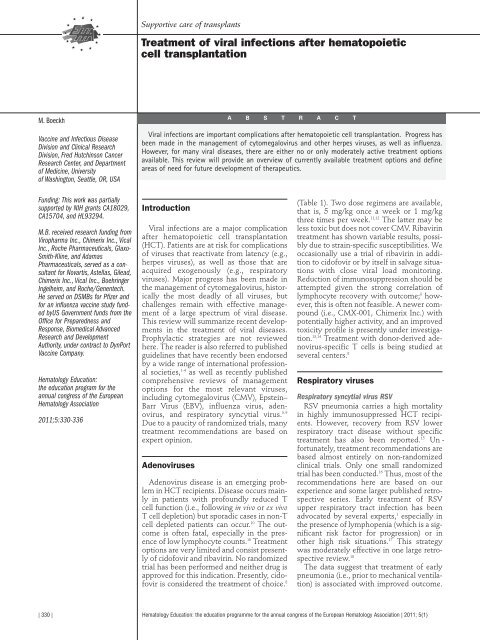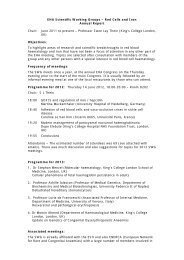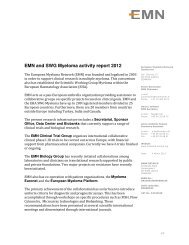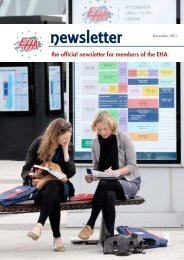H e m a t o lo g y E d u c a t io n - European Hematology Association
H e m a t o lo g y E d u c a t io n - European Hematology Association
H e m a t o lo g y E d u c a t io n - European Hematology Association
You also want an ePaper? Increase the reach of your titles
YUMPU automatically turns print PDFs into web optimized ePapers that Google loves.
M. Boeckh<br />
Vaccine and Infect<strong>io</strong>us Disease<br />
Divis<strong>io</strong>n and Clinical Research<br />
Divis<strong>io</strong>n, Fred Hutchinson Cancer<br />
Research Center, and Department<br />
of Medicine, University<br />
of Washington, Seattle, OR, USA<br />
Funding: This work was partially<br />
supported by NIH grants CA18029,<br />
CA15704, and HL93294.<br />
M.B. received research funding from<br />
Viropharma Inc., Chimerix Inc., Vical<br />
Inc., Roche Pharmaceuticals, Glaxo-<br />
Smith-Kline, and Adamas<br />
Pharmaceuticals, served as a consultant<br />
for Novartis, Astellas, Gilead,<br />
Chimerix Inc., Vical Inc., Boehringer<br />
Ingelheim, and Roche/Genentech.<br />
He served on DSMBs for Pfizer and<br />
for an influenza vaccine study funded<br />
byUS Government funds from the<br />
Office for Preparedness and<br />
Response, B<strong>io</strong>medical Advanced<br />
Research and Deve<strong>lo</strong>pment<br />
Authority, under contract to DynPort<br />
Vaccine Company.<br />
Hemato<strong>lo</strong>gy Educat<strong>io</strong>n:<br />
the educat<strong>io</strong>n program for the<br />
annual congress of the <strong>European</strong><br />
Hemato<strong>lo</strong>gy Associat<strong>io</strong>n<br />
2011;5:330-336<br />
Supportive care of transplants<br />
Treatment of viral infect<strong>io</strong>ns after hematopoietic<br />
cell transplantat<strong>io</strong>n<br />
Introduct<strong>io</strong>n<br />
Viral infect<strong>io</strong>ns are a major complicat<strong>io</strong>n<br />
after hematopoietic cell transplantat<strong>io</strong>n<br />
(HCT). Patients are at risk for complicat<strong>io</strong>ns<br />
of viruses that reactivate from latency (e.g.,<br />
herpes viruses), as well as those that are<br />
acquired exogenously (e.g., respiratory<br />
viruses). Major progress has been made in<br />
the management of cytomega<strong>lo</strong>virus, historically<br />
the most deadly of all viruses, but<br />
challenges remain with effective management<br />
of a large spectrum of viral disease.<br />
This review will summarize recent deve<strong>lo</strong>pments<br />
in the treatment of viral diseases.<br />
Prophylactic strategies are not reviewed<br />
here. The reader is also referred to published<br />
guidelines that have recently been endorsed<br />
by a wide range of internat<strong>io</strong>nal profess<strong>io</strong>nal<br />
societies, 1-4 as well as recently published<br />
comprehensive reviews of management<br />
opt<strong>io</strong>ns for the most relevant viruses,<br />
including cytomega<strong>lo</strong> virus (CMV), Epstein–<br />
Barr Virus (EBV), influenza virus, adenovirus,<br />
and respiratory syncytial virus. 5-9<br />
Due to a paucity of randomized trials, many<br />
treatment recommendat<strong>io</strong>ns are based on<br />
expert opin<strong>io</strong>n.<br />
Adenoviruses<br />
Adenovirus disease is an emerging problem<br />
in HCT recipients. Disease occurs mainly<br />
in patients with profoundly reduced T<br />
cell funct<strong>io</strong>n (i.e., fol<strong>lo</strong>wing in vivo or ex vivo<br />
T cell deplet<strong>io</strong>n) but sporadic cases in non-T<br />
cell depleted patients can occur. 10 The outcome<br />
is often fatal, especially in the presence<br />
of <strong>lo</strong>w lymphocyte counts. 10 Treatment<br />
opt<strong>io</strong>ns are very limited and consist presently<br />
of cidofovir and ribavirin. No randomized<br />
trial has been performed and neither drug is<br />
approved for this indicat<strong>io</strong>n. Presently, cidofovir<br />
is considered the treatment of choice. 8<br />
A B S T R A C T<br />
Viral infect<strong>io</strong>ns are important complicat<strong>io</strong>ns after hematopoietic cell transplantat<strong>io</strong>n. Progress has<br />
been made in the management of cytomega<strong>lo</strong>virus and other herpes viruses, as well as influenza.<br />
However, for many viral diseases, there are either no or only moderately active treatment opt<strong>io</strong>ns<br />
available. This review will provide an overview of currently available treatment opt<strong>io</strong>ns and define<br />
areas of need for future deve<strong>lo</strong>pment of therapeutics.<br />
(Table 1). Two dose regimens are available,<br />
that is, 5 mg/kg once a week or 1 mg/kg<br />
three times per week. 11,12 The latter may be<br />
less toxic but does not cover CMV. Ribavirin<br />
treatment has shown variable results, possibly<br />
due to strain-specific susceptibilities. We<br />
occas<strong>io</strong>nally use a trial of ribavirin in addit<strong>io</strong>n<br />
to cidofovir or by itself in salvage situat<strong>io</strong>ns<br />
with c<strong>lo</strong>se viral <strong>lo</strong>ad monitoring.<br />
Reduct<strong>io</strong>n of immunosuppress<strong>io</strong>n should be<br />
attempted given the strong correlat<strong>io</strong>n of<br />
lymphocyte recovery with outcome; 8 however,<br />
this is often not feasible. A newer compound<br />
(i.e., CMX-001, Chimerix Inc.) with<br />
potentially higher activity, and an improved<br />
toxicity profile is presently under investigat<strong>io</strong>n.<br />
13,14 Treatment with donor-derived adenovirus-specific<br />
T cells is being studied at<br />
several centers. 8<br />
Respiratory viruses<br />
Respiratory syncytial virus RSV<br />
RSV pneumonia carries a high mortality<br />
in highly immunosuppressed HCT recipients.<br />
However, recovery from RSV <strong>lo</strong>wer<br />
respiratory tract disease without specific<br />
treatment has also been reported. 15 Un -<br />
fortunately, treatment recommendat<strong>io</strong>ns are<br />
based almost entirely on non-randomized<br />
clinical trials. Only one small randomized<br />
trial has been conducted. 16 Thus, most of the<br />
recommendat<strong>io</strong>ns here are based on our<br />
experience and some larger published retrospective<br />
series. Early treatment of RSV<br />
upper respiratory tract infect<strong>io</strong>n has been<br />
advocated by several experts, 1 especially in<br />
the presence of lymphopenia (which is a significant<br />
risk factor for progress<strong>io</strong>n) or in<br />
other high risk situat<strong>io</strong>ns. 17 This strategy<br />
was moderately effective in one large retrospective<br />
review. 18<br />
The data suggest that treatment of early<br />
pneumonia (i.e., pr<strong>io</strong>r to mechanical ventilat<strong>io</strong>n)<br />
is associated with improved outcome.<br />
| 330 | Hemato<strong>lo</strong>gy Educat<strong>io</strong>n: the educat<strong>io</strong>n programme for the annual congress of the <strong>European</strong> Hemato<strong>lo</strong>gy Associat<strong>io</strong>n | 2011; 5(1)












